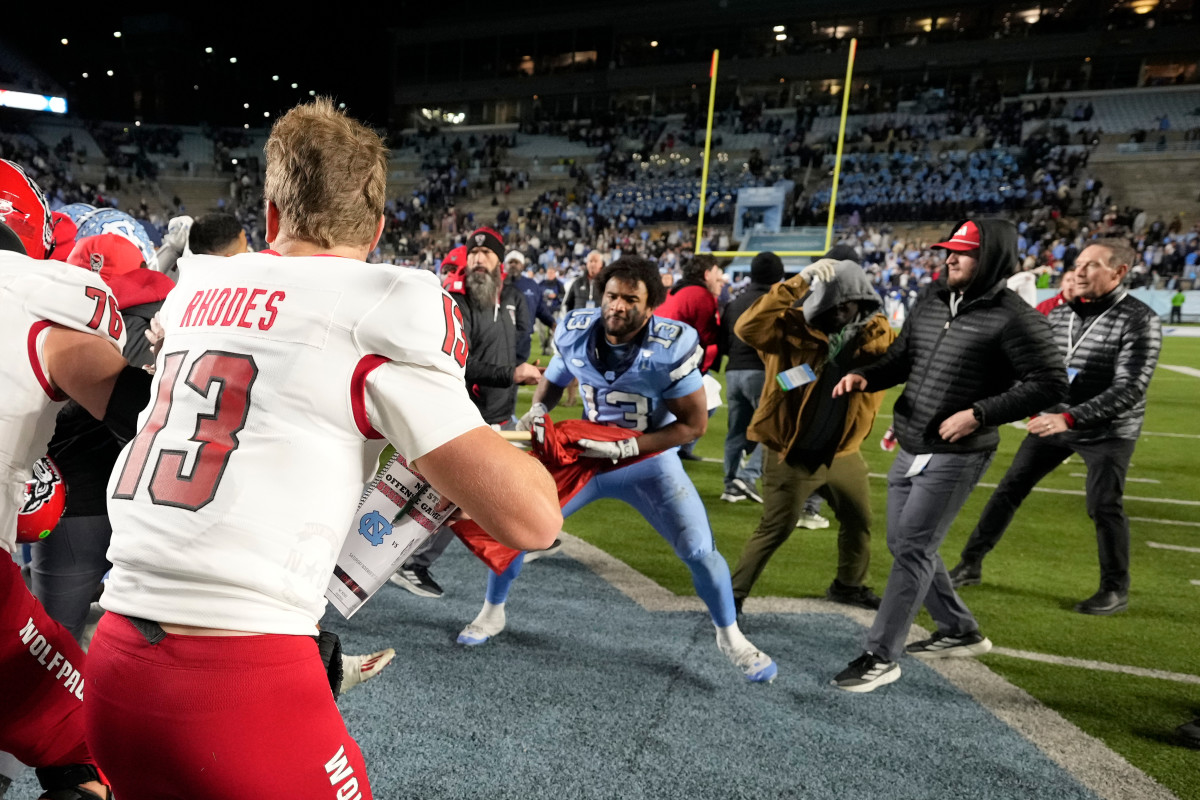
Rivalry week lived up to its billing this past weekend, delivering plenty of animosity, heated confrontations, and memorable upsets that will be talked about for a while. This will surely be a weekend to remember; however, amid the chaos, one issue has sparked intense debate: the controversial act of flag planting on a rival's logo after a hard-fought victory. Is this post-game display of dominance a rightful action for the victor, or does it cross the line into just plain disrespect?
This gesture was done across many rivalry games this weekend; however, notably four of them resulted in a brawl or an altercation between the two teams after. With emotions through the roof after a hard-fought game against your most hated rival, it’s easy to see why something like a flag plant on their logo would set so many people off.

The act of flag planting gained widespread attention in 2017 when former Oklahoma quarterback Baker Mayfield planted a flag on Ohio State’s midfield logo following the Sooners’ win over the Buckeyes. Since then, flag planting has become more common across college football, but this past Saturday, it reached new heights.
Mayfield, who popularized the gesture, weighed in on the controversy: "OU-Texas does it every time they play," he said. "It’s not anything special, you take your 'L' and move on." Asked whether the NCAA should intervene, Mayfield was clear in his opposition: "College football is meant to have rivalries. That’s like the Big 12 banning the ‘horns down’ signal. Just let the boys play."
Baker Mayfield was asked about the four flag planting incidents during college rivalry weekend. It was something he did at Ohio State in 2017. “College football is meant to have rivalries. That’s like the Big 12 banning the ‘horns down’ signal. Just let the boys play.” pic.twitter.com/XCLmjvUrDQ
— JennaLaineESPN (@JennaLaineESPN) December 2, 2024
While I’m not necessarily advocating for the act of flag planting, I do believe that when you win, you should be able to celebrate as long as it does not cross any moral or ethical boundaries. If you’re the losing team, you have to take that loss, and let it fuel you for the next matchup.
You had 60 minutes of football to defend your logo on the field. Don’t start a fight after the game just because the other team is celebrating. As Mayfield mentioned, college football, and sports in general, are at their best when rivalries are allowed to be fiery and a little chaotic.
It’s what makes the competition so intense and thrilling. When athletes aren’t just playing for a win or loss on the stat sheet, but when pride and egos are on the line, the stakes rise for both the players and the fans.
Take Ohio State, for example, they could still go on to win the National Championship, but coaches, players, and fans alike would still be unsettled about their loss to Michigan. Or look at Florida, who beat a Florida State team that finished the season at 2-10, yet the Gators celebrated their win as if they had clinched a playoff berth.
These games matter deeply to the players and fans, and trying to regulate how a team celebrates a hard-fought victory only serves to dilute the very passion and intensity that makes college football great.
So, stop protecting feelings and let teams plant their flags. Let the emotions flow; it's part of what makes the sport so special.
More must-reads:
- Ryan Day assigns blame for Ohio State's stunning loss to Miami in CFP
- No. 9 Alabama hits new low under HC Kalen DeBoer with blowout loss to No. 1 Indiana
- The 'CFP appearances' quiz
Breaking News
Trending News
Customize Your Newsletter
 +
+
Get the latest news and rumors, customized to your favorite sports and teams. Emailed daily. Always free!








